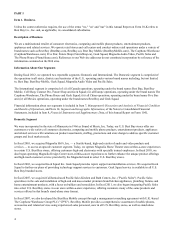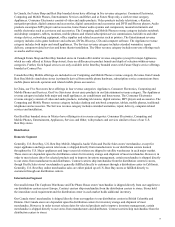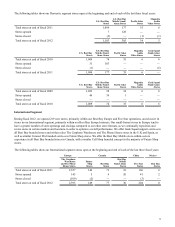Best Buy 2012 Annual Report Download - page 14
Download and view the complete annual report
Please find page 14 of the 2012 Best Buy annual report below. You can navigate through the pages in the report by either clicking on the pages listed below, or by using the keyword search tool below to find specific information within the annual report.14
Our results of operations could materially deteriorate if we fail to attract, develop and retain qualified employees.
Our performance is dependent on attracting and retaining qualified employees who are able to develop the skills necessary to
achieve our business strategies. We believe our competitive advantage is providing unique end-to-end solutions for each
individual customer, which requires us to have highly trained and engaged employees. Our success depends in part upon our
ability to attract, develop and retain a sufficient number of qualified employees, including store, service and administrative
personnel. The turnover rate in the retail industry is high, and qualified individuals of the requisite caliber and quantity needed
to fill these positions may be in short supply in some areas. Our inability to recruit a sufficient number of qualified individuals
in the future may delay planned openings of new stores or affect the speed with which we expand our initiatives, our exclusive
brands and our international operations. Delayed store openings, significant increases in employee turnover rates or significant
increases in labor costs could have a material adverse effect on our business, financial condition and results of operations.
We face strong competition from traditional store-based retailers, internet-based businesses, our vendors and other
forms of retail commerce, which could materially adversely affect our revenue and profitability.
The retail business is highly competitive. We compete for customers, employees, locations, products and other important
aspects of our business with many other local, regional, national and international retailers, as well as our vendors who offer
their products and services direct to the consumer. We continue to face pressure from our competitors, some of which have
greater market presence and financial resources than we do. In addition, certain internet-based businesses do not collect and
remit state and local sales taxes in all of the states in which we are required to collect and remit such taxes. These factors could
require us to reduce our prices or increase our costs of doing business. In addition, because our business strategy includes
staffing and support models for both products and services, our cost structure is generally higher than those offering products
only. Some of our vendors also continue to interact directly with customers by embedding their services into the products we
sell. As a result of this competition and the potential for direct product distribution, we may experience lower revenue and/or
higher operating costs, which could materially adversely affect our results of operations.
Our results of operations could materially deteriorate if we fail to maintain positive brand perception and recognition.
We operate a global portfolio of brands with a commitment to customer service and innovation. We believe that recognition and
the reputation of our brands are key to our success. The advent of social media, which uses web-based technologies for
interactive dialogue, represents an increasingly popular outlet for various types of feedback, opinions and criticism surrounding
the perception and reputation of our business and our brands. Damage to the perception or reputation of our brands could result
in declines in customer loyalty, lower employee morale and productivity concerns, and vendor relationship issues, and could
ultimately have a material adverse effect on our business, financial condition and results of operations.
Our growth is dependent on the success of our strategies.
Our growth is dependent on our ability to identify, develop and execute our strategies. Our failure to properly deploy and utilize
capital and other resources may adversely affect our initiatives designed to assist our customers in connecting to a digital
lifestyle. We are focusing on areas where we see the greatest opportunities for growth and profit: growth in connections in
mobile phones, tablets and other computing devices; enhanced digital and e-commerce strategies, including competitive online
pricing, broader use of free shipping, expanded online assortment and the further development of the Best Buy Marketplace;
growth in our services business; and expansion of our established business in China. Likewise, we recently announced a series
of actions intended to transform our business, focusing on improving the customer experience and our financial performance,
including the roll-out of our Connected Store format in select markets. Misjudgments or flaws in our execution of these
initiatives and strategies could have a material adverse effect on our business, financial condition and results of operations.
Refer to Item 7, Management's Discussion and Analysis of Financial Condition and Results of Operations, for further
information surrounding our strategies.
Our ability to generate profitable growth is dependent upon the effective management of our property portfolio.
Our future growth is dependent, in part, on our ability to build, buy or lease new stores. We compete with other retailers and
businesses for suitable locations for our stores. Local land use, local zoning issues, environmental regulations and other
regulations applicable to the types of stores we desire to construct may impact our ability to find suitable locations, and also
influence the cost of building, buying and leasing our stores. We also may have difficulty negotiating real estate purchase
agreements and leases on acceptable terms. Failure to manage effectively these and other similar factors will affect our ability
to build, buy and lease new stores, which may have a material adverse effect on our future profitability.
























